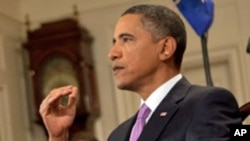As U.S. President Barack Obama prepares to start his second year in office, national security has jumped to the top of his priority list in the wake of the failed bombing attempt aboard a U.S. jetliner on Christmas Day. Our national correspondent has more on what is becoming a crowded 'to-do' list for the president in 2010.
National security concerns are now center-stage for Mr. Obama as he tries to rebut critics who say his administration was slow to react to the Christmas bombing attempt aboard a passenger plane bound for Detroit.
"I am less interested in passing out blame than I am in learning from and correcting these mistakes to make us safer," said President Obama. "For ultimately, the buck stops with me. As president, I have a solemn responsibility to protect our nation and our people. And when the system fails, it is my responsibility."
Republicans and even a few Democrats were critical of what they believe was the administration's slow and uneven early response to the failed terror attack.
Senator Jon Kyl, a Republican from Arizona, told Fox News Sunday the president must do more to demonstrate his commitment to fighting the war on terror.
"And when the president says that we are at war, what he needs to do is back that up with a sense of urgency and instruct the people that work for him that they have to treat this like a war, including gathering all the intelligence you can gather," said Jon Kyl.
For much of President Obama's first year in office, the focus was on domestic issues, the economy, bank and auto bailouts, and health-care reform.
Republicans were generally unified in opposition to the president's domestic agenda, though many of them supported Mr. Obama's decision to send an additional 30,000 troops to Afghanistan.
But the re-emergence of terrorism and security issues presents the president with a new set of political challenges this year, says University of Virginia expert Larry Sabato.
"Republicans have been seen in the entire modern era as being tougher on national defense and national security," said Larry Sabato. "Democrats have been seen as weak on national defense and national security. Now, I should hasten to add these images are sometimes true and sometimes they aren't, but they have stuck since the Vietnam War era."
The renewed emphasis on security comes as Congress prepares to head into a final round of negotiations and debate on health-care reform, the president's top domestic priority.
Democrats want a final health-care bill signed into law by the president sometime in the next several weeks.
But political experts are divided on whether Democrats will benefit from passage of a health care bill in the November midterm congressional elections.
Matt Dallek is a political historian with the Bipartisan Policy Center in Washington:
"I think it helps him tremendously politically," said Matt Dallek. "Now, it is unlikely that he will see these political benefits this year in the midterm elections. But certainly in 2012 it is possible, and certainly in terms of his historical legacy."
But other political experts are not so sure.
Tom DeFrank is Washington bureau chief for the New York Daily News and a frequent guest on VOA's 'Issues in the News' program.
DeFrank says the health-care debate has rallied grass-roots conservatives around the country opposed to the cost and reach of the health-care bill, and that could help Republicans make gains in November.
"Now the conventional wisdom has always been that they would not be able to pick up enough seats in either the House or the Senate to wrest control from the Democrats," said Tom DeFrank. "That is probably still the case, but there is an anti-Washington wind, maybe not a totally anti-Obama wind, but there is an anti-Washington, anti-incumbent wind out there."
The congressional elections will increasingly draw the president's attention as the year goes on, and one of Mr. Obama's challenges will be rallying Democratic voters to go the polls in support of Democratic candidates in November.
This is author and MSNBC political analyst Richard Wolffe:
"What the Democrats need to discover is not just good, strong candidates," said Richard Wolffe. "It is a way to rev up their base. They have not found that so far and Republicans, in painting Obama as some sort of socialist and fascist in these ridiculous caricatures, they have managed to stir up their base, and that is what midterm elections are all about."
Analyst Larry Sabato says it will be the state of the national economy and the unemployment rate that will determine the president's political fate this year and the chances for Republican gains in Congress.
"It will be a function of Obama's popularity, of what happens in the war on terror, and of course the unemployment rate and the economy," he said. "How far does that unemployment rate come down before November?"
New presidents historically lose congressional seats in their first midterm election. But the prospect of a Republican take-over of the House or even narrower Democratic majorities in Congress would seriously complicate the president's ability to pass legislation as he heads for his own re-election campaign in 2012.
Security and Economy Issues Top Obama's Agenda for 2010
- By Jim Malone





